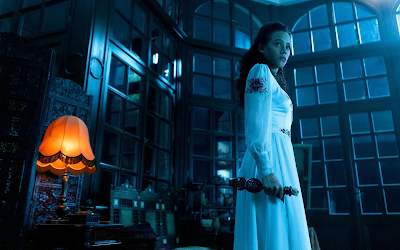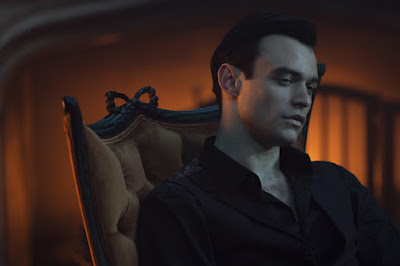The main villain in The Invitation (2022, directed by Jessica M. Thompson) looks like someone crossed Sean Connery and Udo Kier in a genetics lab, which for a film like this one is like flashing a big red light to warn the heroine (and the audience) to run away as fast as she can. She does not run away, alas, and gets herself ensnared in a Gothic mansion full of creepy aristocrats and even creepier family history. I sometimes wonder if the Gothic as a mode of filmmaking hasn't worn out its usefulness in the age of microchips and LED lights, and this film doesn't make a case for the opposite point of view. But I also wonder if it's just the filmmakers who make use of it. There's plenty of evidence on screen that the latter case is where the rot resides.
The tale here follows Evelyn Jackson, a ceramics artist from New York who supports her art with a dismal gig as a caterer. One a whim, she takes one of those ancestry DNA tests and discovers that she's descended from the Alexanders, a wealthy family from England. Her grandmother had an affair with one of the Alexanders when working as serving staff, causing a huge scandal that forced her family to leave England for New York. They never spoke of it to Evie. The Alexanders for their part are keen to meet her and her distant cousin, Oliver, offers to meet her while on a business trip to New York. His enthusiasm for bringing her into the family is effusive and on first meeting, he invites her to a huge get-together in England, all expenses paid. The event is a wedding. After debating it with her best friend, she reluctantly agrees to attend. Soon she is whisked to the rambling estate of New Carfax Abbey, where she meets the various other members of the family and the other members of the wedding party. Her first impression is formed by the butler, the scabrous Mr. Fields, who is in the process of berating the new serving staff. He mistakes Evie for their number and berates her, as well. She's saved from him by the lord of the manor, Walter De Ville, who is charming and kind to her. She is shown to her accommodations with the promise of more of Mr. De Ville's company later, and the advice to stay out of the library. The room she's assigned has a grill outside of it to protect from shrikes. The previous occupant came to a bad end, it seems. Elsewhere in the house, the staff is disappearing. Soon, Evie is being romanced. She is provided with a gorgeous party dress for the festivities. At the reception, she meets the bridesmaids, Viktoria and Lucy, one haughty and condescending, the other sweet and friendly. Walter comes and sweeps here to another part of the manor, a room that functions as an art studio, where they watch the fireworks. The next day she has a fraught day at the spa with Viktoria and Lucy, and is again provided with a gorgeous gown for later in the evening. But her suspicions lead her to the library, where she discovers a dossier about her. Her instinct is to run, but Walter sweet talks her into staying and they spend a romantic afternoon together. When Walter teasingly asks if she'll marry him, she teasingly agrees, but not really. Later, at the rehearsal dinner, the bride and groom are mysteriously absent, and the main course brings her predicament into horrifying focus....
It doesn't take a literary scholar to suss out the roots of this narrative. Names like "New Carfax Abbey" and a late appearance by characters named for Jonathan and Mina Harker are unsubtle, even if this isn't exactly the narrative one finds in Dracula. Like Rodin imitating Michelangelo, the filmmakers have left the knife. In terms of its structure, updated for the 21st century, has more in common with the 1979 Rod Hardy film, Thirst, with its cult of vampires looking for their reincarnated queen, and with the more recent Ready or Not, with its sinister in-laws and disaster wedding. The film also tips its hat to The Texas Chain Saw Massacre when it allows its heroine to escape the manor and run into the arms of a kindly old couple who are in on the game. Even at this late date, running into the arms of strangers who turn out to be more monsters still works a trick. The film even has things to say beyond its remit as a dumb horror movie: built into its casting of Nathalie Emmanuel as Evie and by placing her as a working-class black woman among a predatory billionaire class, the commentary on the current body politic of vampire capitalists and aristocrats beyond the scope of the law should be manifestly obvious. Again, this is unsubtle. If you miss the commentary, the fates of the vanishing maids underlines what this film is trying to say. As a horror movie that's aware of its socio-political moment in time, it nails the zeitgeist even if it resorts to broad strokes in order to do it. And that's fine. That's what horror movies do. Hell, that's even at the root of the Gothic mode in which this is filmed. The filmmakers clearly know where they want to steer their narrative and what signposts they want to reference on the way.
What this lacks is self-discipline. As an example of basic technical filmmaking, this is wanting. Like many horror movies of recent generations, this is a film that relies a bit too heavily on jump scares and soundtrack stingers, but this isn't a deal-breaker. You get used to this even if the film would be more successful creeping away rather than jumping out and shouting "boo!" It has a sense of dramatic structure, too, given that it places a version of Chekov's gun into an early scene and dutifully pays off on it near the end, once the film's mask is off and it lets its freak flag fly. This is all stuff that comes from an awareness of drama and of the horror genre itself. When I say it comes up wanting with regard to technical filmmaking, I mean in terms of basic blocking and editing. A lot of the scenes in this film seem like they're constructed of coverage, as if the filmmakers shot a LOT of angles (hey, this is permitted by digital filmmaking because you don't spend money developing expensive film stock) and then picked around from everything they shot in order to assemble their scenes. A lot of the shots and edits seem pointless. The first scene where Evie wakes up in her room at New Carfax is a good example, because rather than worrying about her dramatic predicament, I started to wonder why the film chose particular shots, particular cuts, and why so many of both? There's an element of indecisiveness in the way this film is shot, as if the filmmakers can't make up their minds where to put the camera or how long to let their scenes play out. In the film's defense, the money shots near the end seem on firmer ground, perhaps because they were storyboarded and animaticked to accommodate special effects. This reminds me of the bad old days of Friday the 13th (the og film, not the remake), where the gore gags were uniformly better-directed than the scenes around them because Tom Savini was altogether more talented a filmmaker than Sean Cunningham. Which isn't to take the dramatic structure of The Invitation completely off the hook. After its plot resolves, the film has a coda that is profoundly ill-advised and ill-shot. I don't know if they were planning on building a franchise here or what, but the end of the film doesn't work on any level.
I would be remiss if I didn't give credit where credit is due. The star of this film, Nathalie Emamanuel, is appealing, and has actual acting chops honed on a bunch of different projects, some of them very high profile indeed. She's the closest thing to a movie star in the cast. Sean Pertwee's Mr. Fields is another indelible character conjured more from the actor's own force of personality than from the material he's been asked to play. Pertwee is another familiar face; he's a reliable character actor at this point after a career of sometimes thankless roles. Thomas Doherty, by contrast, tends to over-act, especially once the film takes off the training wheels, and chews the scenery with reckless abandon. The rest of the cast tries gamely, but they don't really rise above. And that's kind of this film in a nutshell. Elements of the film try gamely--it's a handsomely decorated film, both in terms of sets and costumes--and it's fortunate to have a cast that underpins the film with professional work when called to do so. But it's all for naught. This particular fish rots from the head.

This blog is supported on Patreon by wonderful subscribers. If you like what I do, please consider pledging your own support. It means the world to me.




















No comments:
Post a Comment